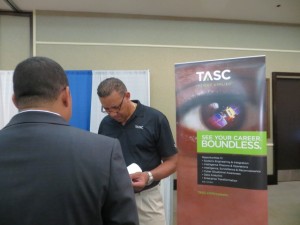Government contracting work has changed. The huge boom in employment over the past decade in intel, in supporting two wars, and in increased outsourcing has turned. The past two years have seen big cutbacks across the landscape. With the focus on cutting the budget that will continue.
Many people are looking and waiting and discouraged. You can be that guy or you can try some new things. You know the classic definition of insanity: doing the same thing over again and expecting different results.
Option 1. Reboot your job search
Far too many people got used to depending simply on their security clearances to get a job in the days when many defense contractors were desperate for even ‘warm bodies.’ Your security clearance alone doesn’t cut it now.
Focus on your achievements.
What are your best skills now? How do you demonstrate your value to a hiring manager? These need to be clear on your resume, your LinkedIn profile, and all your other marketing materials. Time and again I see resumes full of job descriptions that tell me nothing about the person! No hiring manager cares what you were responsible for. They want to know results.
Work your network.
OK, so you told a lot of people you needed a job. That is not networking. Networking is human communication and connection. You should be asking for information about target employers, checking out potential contacts, updating your knowledge of who is hiring for what work, discovering trends that can help you. This includes working your way back through a lot of older connections while building new ones. It means some action on relevant professional groups online and at events. Networking is your key to a job especially if you are senior in experience or highly paid.
Use job fairs and job boards effectively
Cleared employers pay to find people this way because it is effective and they are still hiring. But too many applicants have old-fashioned or ineffective resumes. Many set up one limited job search agent to look for the same old job they have. Job fair attendees arrive without a focused personal pitch. Most do not even try to network with other attendees. Learn a little about these job search avenues and you can quickly improve your presentation so employers do look at you.
Option 2. Change your parameters
Are you looking for the same old jobs in the same old places? Maybe the jobs have changed or moved. Maybe you offer something special.
Make the most of all your skills
Look at your successes. What do they tell you about yourself that makes you distinct from others in your field? Have you made this clear on your resume and in your networking efforts? Have you asked your connections about ideas for related jobs which use these skills or just focused on exactly what you did in your current/last job?
What locations will you consider
Another way to change your search is to consider re-locating. Are there more jobs of the type you want in some other area? Beware of a job in an area where there are few others in that field. But also do not think that your location is the best one, do your research. This is not an easy change but it can be a very smart one.
Option 3. Leave defense and intel contracting
This may be the most difficult to think about. Maybe you were in the military and defense or intel contracting after that. Have you even thought about what else you can do with the skills you have?
What civilian employers need your skills?
This is a research process at first. Look at all your skills, think of your past work successes as a bridge to your future goals.
Sometimes it is obvious: you got critical parts to the right units in Iraq; now you might look at Amazon, UPS, USPS and most big companies which need logistics expertise. Sometimes it is less obvious: you think of intel in DIA/NSA/CIA terms; but there is a huge business intelligence field you may have no idea exists.
How can you target new opportunities?
Ask around your network for contacts outside the defense contracting space and learn how your skills might fit into new arenas. Read up on areas which interest you. Go talk with the reference librarian at your local public library and learn how to research potential targets in your desired field. Consider an ‘encore career’ doing something new you love.
Good jobs exist but more people than ever are searching for them. So companies and contracts have become ever more specific on skills and experience. Your job search now takes extra effort, more self-understanding, and a willingness to go that ‘extra mile.’ Reach out for help. Use all the resources you can find. Learn new options. Keep your network informed as you make changes so they can help. Stay positive online and keep your profiles up-to-date so employers see the best you. You can do this!
Originally published in ClearedJobs.net





